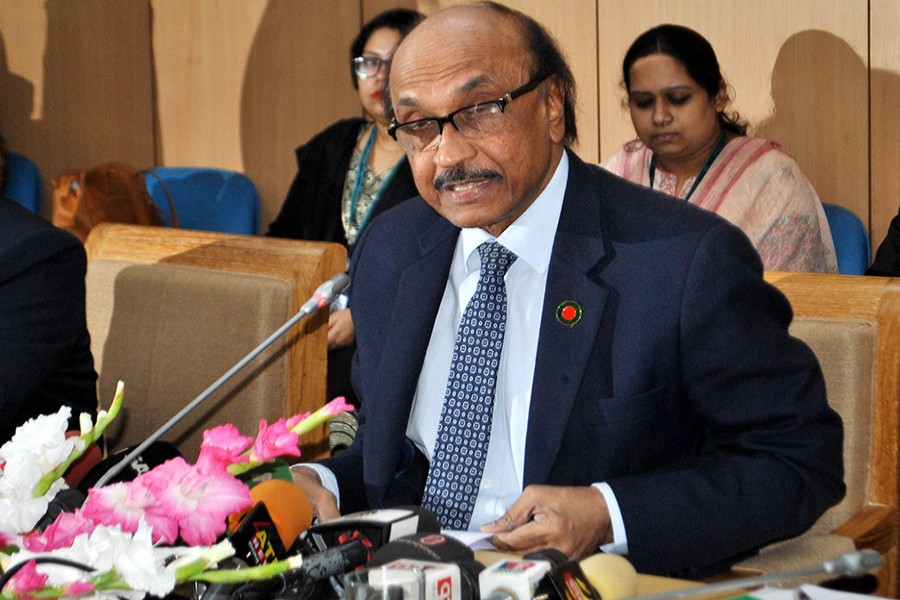
Published :
Updated :

The central bank governor has said the growing mismatch in export-import growth could trigger 'additional shocks' in the troubled banking system.
He hinted that the mismatch could create scope for money laundering, thus damaging financial institutions and the economy as a whole.
To avert such dire consequences, Bangladesh Bank (BB chief Fazle Kabir urged both public and private commercial banks to be cautious about the matter.
He issued the warning while addressing a conference on 'Anti-money Laundering (AML) and Combating Financing of Terrorism (CFT)' at a city hotel on Saturday.
Bangladesh Financial Intelligence Unit (BFIU), Association of Bankers, Bangladesh (ABB) and Association of Anti-money laundering Compliance Officers of Banks in Bangladesh (AACOBB) jointly organised the event.
Since the final quarter of the last calendar year, Mr Kabir said, the country's import started to rise in a much faster way than export.
Citing the available statistics, he said import grew by 25 per cent over the past six months against around 6.0 per cent export growth.
"If the import of industrial raw materials rises, export too increases in a similar way," the BB governor mentioned.
He said the situation could create "additional shocks or risks", which could remain for long.
"That means this can damage the institutions, but we don't like to see that. We have to be wary," he said.
Mr Kabir laid importance of paying a special attention to mobile banking so that no quarters misuse the effective tool of financial inclusions.
With the increasing global integration, he said, Bangladesh needs a financial system that is much credible, secure and trusted to stakeholders.
"That is the reason why we need to take care of AML and CFT compliances," Mr Kabir added.
A press statement on the event said some recent banking activities have created doubt among the people, which is a bad sign for banks.
The chief of the regulator put emphasis on some quick measures to ensure monetary discipline and corporate governance in the financial institutions.
BB deputy governor Abu Hena Md Razee Hassan urged the bankers to be careful of their duties as a lack in a bank could cause serious disaster.
On efforts to stop money laundering, he said Bangladesh outperformed 28 nations in such ranking last year.
It is now positioned as the 82nd riskiest country, Mr Hassan disclosed.
Seeking cooperation from bankers, he said BFIU decisions sometimes may hurt individual banker, but they are for the betterment of the economy.
BFIU consultant Deb Prasad Debnath said bankers need to pay serious attention not only to money laundering risks, but also to other attendant risks.
He termed cyber fraud an emerging challenge for the banking system here.
Citing a report, Mr Debnath said Asian countries are more vulnerable to cyber risks due to poor compliance culture in the region.
"We've to take care of it," he told the programme.
ABB chairman Syed Mahbubur Rahman said one of the biggest challenges facing the compliance department is to find a fitting measure to control money laundering.
"It might lead to some unpleasant consequences in the [banking] system," he said.
Mr Rahman, also managing directors and CEO of Dhaka Bank Ltd, suggested that AML strategies, policies, procedures and measures be safely handled.
All these are meant to ensure that illegally obtained money was not being used in the banking operation, he said.
BFIU general manager and in-charge of the unit ABM Jahurul Huda moderated the function.
AACOBB chairman and deputy managing director of Bank Asia Ltd Mohammad Borhanuddin also spoke.
A Global Financial Integrity report showed unrecorded capital flow from Bangladesh stood at $61.63 billion between 2005 and 2014, riding mostly on 'misinvoicing'.
Of the total capital flight, $56.83 billion was through trade misinvoicing and the remaining $4.8 billion could not be traced in the balance of payments, it added.
Officials said the biggest chunk of laundered money ends up in Malaysia, Singapore, Thailand, the USA, Canada, Switzerland, the UK and other places where laws protect capital inflows into their countries.
jubairfe1980@gmail.com


 For all latest news, follow The Financial Express Google News channel.
For all latest news, follow The Financial Express Google News channel.